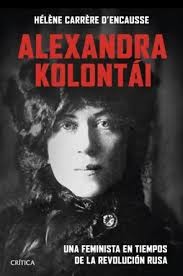
Original language: French
Original title: Alexandra Kollontai. The Valkyrie of the Revolution
Translation: Lara Cortes
Year of publication: 2021
Valuation: Highly recommended
Despite having been, among other things, Grand Cross of the Legion of Honor, member of the French Academy since 1991, Perpetual Secretary of the aforementioned academy since 1999 or Princess of Asturias Prize for Social Sciences, Hélène Carrèrre D’Encausse is better known in these parts for being the mother of Emmanuel Carrère than for her own merits. “Life” things, you know.
The fact is that we are finally making our debut in reviewing Carrèrre D’Encausse and we do it with this magnificent biography of Alexandra Kolontai, who was the People’s Commissar of Social Affairs (aka Minister of Social Affairs) back in 1917-18 and the first Ambassador in history.
The book begins with a brief introduction about the evolution of the political situation in Russia in the 20th century (Decembrists, abolition of serfdom, Tkachov, Bakunin, Pugachow, growth of industry, labor and social conflict, etc.) that serve to place Kolontai in its historical context.
After that introduction, Carrèrre D’Encausse gets into the subject and tells us about the life and work of a fascinating and contradictory character located in a historical context as terrible, convulsive and attractive as Russia/USSR from 1905-1945. In this narrative, the intimate side of Kolontai’s life is interspersed with her public side, which highlights her permanent involvement in policies in favor of women and her diplomatic work in Scandinavia in the late 1920s and in the 1920s. 30.
There are three aspects that I would like to highlight in the more “generic” side of the text:
- its rhythm (we already know where Emmanuel has inherited it from). Yes, there are parts of the book that can be read almost as a “political thriller”!!!
- its predominantly informative nature. Great knowledge at a “theoretical” level is not necessary to follow the text. Minimal prior knowledge and interest, yes, but not being a specialist in Marxism-Leninism, oh well.
- his demystifying spirit even without failing to recognize the merits of each one: Lenin was not a saint (there was also a bloodthirsty alpha male there), Kolontai was not only a fervent feminist (deep down there is a contradictory being, with his shadows, doubts and questions (and now I develop it more)), etc.
Going into more detail, I will stick with the chapters that cover the period 1917-1939. It seems to me that the author draws very well the atmosphere of hope, terror and paranoia that characterizes the time and I think it is especially relevant and revealing what political and ideological positions are and how they are evolving (Menshevik, Bolshevik, left-wing opposition, Stalinism, etc.) and its relationship with power and its greatest exponents (Lenin, Stalin, Bukharin, Zinoviev, etc.). We are left wondering whether Kolontai was, deep down, an adaptive animal, a sincere revolutionary or someone who, when the time came for the purges and executions, only sought to survive. Maybe a mix of all of the above.
In any case, what is undoubted is that Alexandra Kolontai was a historical character with a beastly power of attraction, a woman “in the land of men” who opened (or tried to open) paths hitherto forbidden to them and that Hélène Carrère D ‘Encausse has brought her closer to us through a most complete and highly recommended biography.
Source: https://unlibroaldia.blogspot.com/2023/11/helene-carrere-dencausse-alexandra.html


